Woman Kicks Out Her Boyfriend And His Dog Because She Proudly Said His Dog Killed A Couple Of Rabbits
People love their dogs, that’s a fact. And when you love someone, you want to spend as much time with them as possible. Also, dog owners very often feel guilty for working a lot and not spending enough time with their pets, and they take them everywhere to make up for the time lost.
Unfortunately, many dog owners don’t stop and think if their dogs are welcome there. It is in our nature to think that we are right and that most people see things our way.
Dog owners are no different. They believe that, because they love dogs, all people do. And that can lead to many misunderstandings, even breakups.
One Redditor had a similar problem, and she shared it online. Her boyfriend loves his dog and tries to make her love it too. But, he is literally shoving it into her face, which causes the opposite reaction. He even brings it to her house, which makes matters even worse.
“I have nothing against dogs, I'm just not a fan of owning them simply because 1. I live in an apartment, and I feel they need a yard and 2. I don't want to do all the clean-up that is involved with them.”
OP asks:

She is seeing "Dude." Dude has a dog. And he loves it.

However, OP is not so crazy about owning a dog or having one visit her home.

In relationships involving pets, attachment theory plays a significant role in understanding dynamics between partners. According to Dr. John Bowlby’s foundational research, attachment styles—formed during childhood—can greatly influence adult relationships. For instance, a partner who has an anxious attachment style may become overly sensitive to perceived threats to their bond, such as the presence of a pet that threatens their partner's affection or attention. This can lead to heightened emotional responses, such as anger or jealousy, particularly if the partner feels that the dog is receiving preferential treatment or if the pet’s behaviors evoke negative associations from their past.
Such emotional responses are not only common but can also be understood through the lens of emotional dysregulation, as noted in a study published in the Journal of Clinical Psychology. The research suggests that individuals with unresolved attachment issues may struggle to manage their emotions when faced with conflict, leading to decisions that might seem extreme, such as choosing to end a relationship over a pet-related incident.
Understanding the Emotional Connection to Pets
The emotional bond between humans and their pets can significantly affect relationship dynamics. Research in animal-assisted therapy has demonstrated that pets can provide emotional support and enhance well-being, yet they can also lead to tension if their behavior conflicts with a partner's values or preferences. A study published in the Journal of Social and Personal Relationships highlights how individuals often anthropomorphize their pets, attributing human-like qualities and emotions to them. This deep emotional connection can lead to defensive behaviors when the pet is criticized, as seen in the case of the woman who expelled her boyfriend and his dog.
Understanding this emotional attachment can enable partners to approach conflicts with empathy. Recognizing that the other person’s bond with their pet is valid, even if it leads to miscommunication, is crucial in fostering patience and compassion in discussions. Couples are encouraged to explore each other’s perspectives and feelings surrounding their animals, potentially leading to more harmonious coexistence.
The Psychology of Pet Ownership and Emotional Attachment
The response to the boyfriend’s dog highlights the complexities of emotional attachment in pet ownership. Research in animal behavior suggests that pets often become integral to their owners' identities and emotional well-being. According to a study published in the Journal of Social Psychology, emotional attachments to pets can evoke strong feelings of love and loyalty, making any perceived threat to that bond particularly distressing.
In this case, the woman’s reaction to the dog’s behavior may reflect deeper insecurities about her relationship and the dynamics of sharing space with a partner’s pet.
Understanding Emotional Attachments to Pets
Dr. Maria Lopez, a clinical psychologist at the University of Virginia, discusses the emotional attachments that individuals form with their pets.
Pets often serve as companions, and when negative events occur, such as a pet harming another animal, it can trigger complex emotional responses in their owners.
Research shows that these attachments can evoke feelings of guilt, shame, and protectiveness, complicating relationships.
He came to her house and brought a dog with him. And then he said something awful like it was nothing:
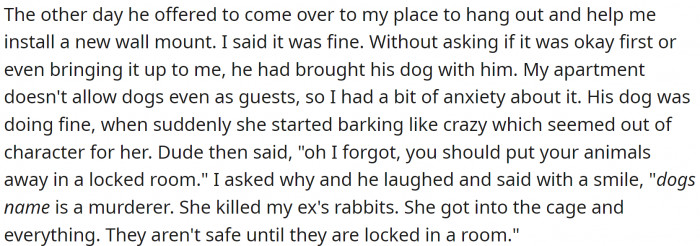
OP was very angry. "Dude" knew about her animals - so why would he bring a dog who kills small critters for fun?
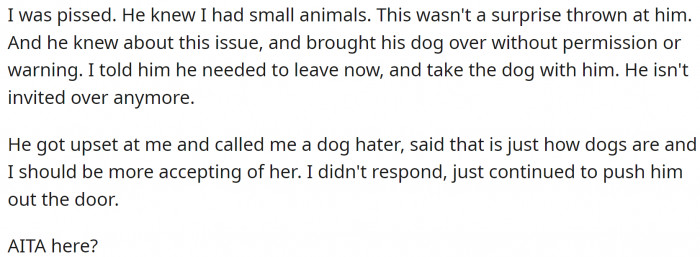
OP shared some additional explanations:
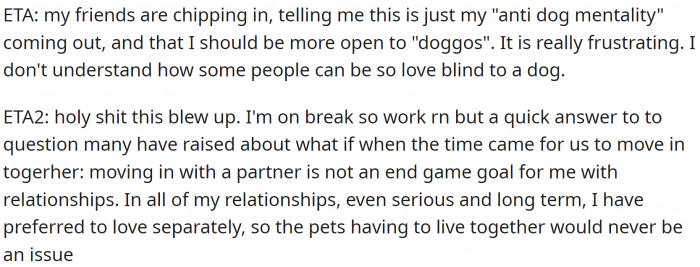
Social Dynamics and Personal Space
Understanding social dynamics within relationships is crucial when discussing conflicts arising from pets. The concept of personal space, as outlined by Edward Hall’s proxemics theory, indicates that our comfort levels with proximity and interaction can vary significantly based on cultural and individual factors. When a partner's pet intrudes on personal space or perceived emotional territory, it can trigger defensive reactions, particularly if one feels threatened or uncomfortable. This is particularly relevant in romantic relationships where the presence of a pet may disrupt the intimate space that partners share, leading to feelings of jealousy, anxiety, or even resentment.
Dr. William Doherty, a family therapist, emphasizes that "conflicts over pets often stem from deeper issues in the relationship, such as unmet needs or boundaries." He suggests that couples should engage in open discussions about their feelings and expectations regarding pets to prevent misunderstandings. For further insights, visit his professional website at Dr. William Doherty. Addressing these dynamics can help foster greater understanding and emotional safety in relationships.
Additionally, the presence of a pet in a relationship can often complicate interpersonal dynamics. Research from the University of Michigan indicates that pets can influence relationship satisfaction, sometimes serving as a source of conflict when behaviors, such as aggression toward other animals, arise. The woman's feelings of discomfort may signal unresolved tensions not only regarding the dog but potentially about her relationship with the boyfriend himself.
This suggests that examining the dynamics between all parties—human and animal—may be necessary for resolving the underlying issues.
Studies indicate that pet owners may feel a sense of responsibility for their pet's behavior, which can lead to heightened emotional reactions when incidents occur.
This sense of responsibility often mirrors deeper psychological patterns related to attachment and control in relationships.
Understanding these dynamics can help individuals navigate their emotional responses more effectively.
Sweet baby

How could someone say something like that so casually.

Redditors shared similar experiences

From a behavioral psychology perspective, the phenomenon of 'pet ownership pride' can be examined through the concept of social identity theory. This theory posits that individuals derive a sense of self from the groups to which they belong, including pet ownership. A person who identifies strongly as a 'dog owner' may feel compelled to defend their pet's actions vigorously, perceiving any criticism as a personal affront. This can lead to heightened defensiveness, which can be detrimental to the relationship, as it may prevent constructive dialogue about shared concerns.
Research indicates that individuals who can separate their identity from their pet's behaviors tend to navigate relational conflicts more effectively. A study published in the Journal of Personality and Social Psychology found that those who view their pets more as companions rather than extensions of themselves are generally more adaptable to relational challenges. For couples experiencing tension over pet-related issues, fostering a more balanced view of pet ownership can alleviate some of the emotional load and facilitate healthier discussions.
Navigating Relationship Conflicts Involving Pets
Effective communication is essential when navigating relationship conflicts involving pets. A clinical psychologist notes that discussing feelings openly can help both partners understand their perspectives and the emotional stakes involved. Research from the Journal of Family Psychology emphasizes that open dialogue can strengthen relationships, particularly when sensitive topics such as pets are involved.
In this case, it may be beneficial for the woman to express her discomfort with the dog’s behavior while also acknowledging the boyfriend’s attachment to his pet, creating a space for mutual understanding.
Addressing Conflict in Pet Ownership
To effectively address conflicts arising from a pet's behavior, open communication is essential.
Encouraging discussions about feelings regarding the pet's actions can help validate emotional responses and foster empathy among those involved.
Seeking mediation can also facilitate constructive conversations, allowing for a focus on solutions rather than blame.
It is not normal behavior
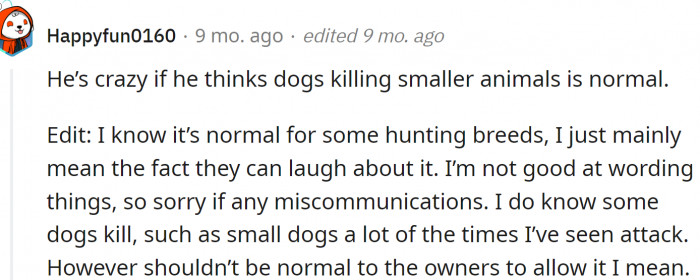
Some dogs have high prey drive
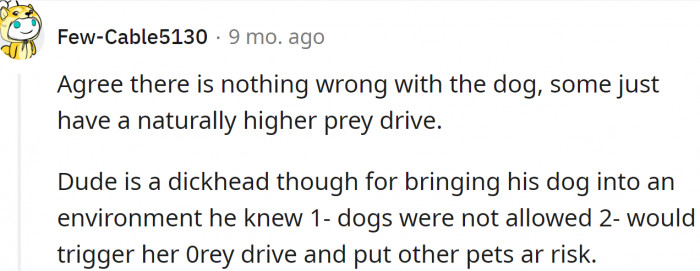
This makes sense:

The Role of Communication in Resolving Conflicts
The importance of effective communication cannot be overstated in resolving conflicts involving pets and partners. Research in communication studies emphasizes that the way individuals express their feelings and needs can significantly influence the outcome of a disagreement. Assertive communication—where one expresses their thoughts and feelings honestly while respecting others—is essential for maintaining healthy relationships. For instance, a partner might express their discomfort with the dog’s behavior by using 'I' statements, such as 'I feel anxious when the dog runs around the house,' rather than placing blame on their partner or the pet.
According to a study from The International Journal of Conflict Management, couples who engage in assertive communication tend to resolve conflicts more effectively and experience higher relationship satisfaction. Therefore, developing skills in assertive communication can be a valuable tool for couples grappling with the complexities of pet ownership and its impact on their relationship.
Moreover, establishing clear boundaries regarding pet behavior can help alleviate tension in relationships. Research indicates that couples who collaboratively set expectations around pet care and behavior report higher relationship satisfaction. The boyfriend and girlfriend could benefit from creating a plan that addresses the dog’s behavior, ensuring both partners feel heard and valued in the pet ownership dynamic.
Implementing training strategies for the dog could also help alleviate concerns, promoting harmony within the household.
Understanding the emotional stakes involved in pet ownership can lead to healthier relationships among all parties.
A psychologist specializing in family dynamics suggests that empathy and open dialogue are crucial in resolving conflicts related to pet behavior.
Recognizing that pets are often seen as family members can help shift focus from blame to well-being.
Sounds right:
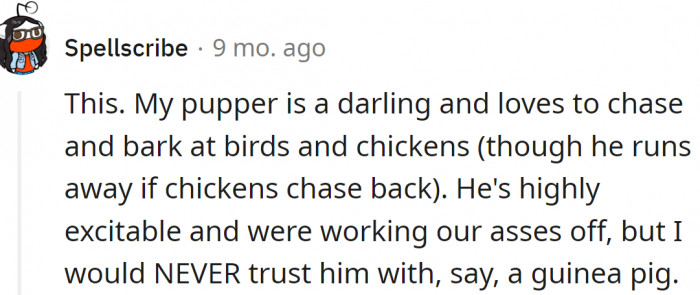
Makes sense:
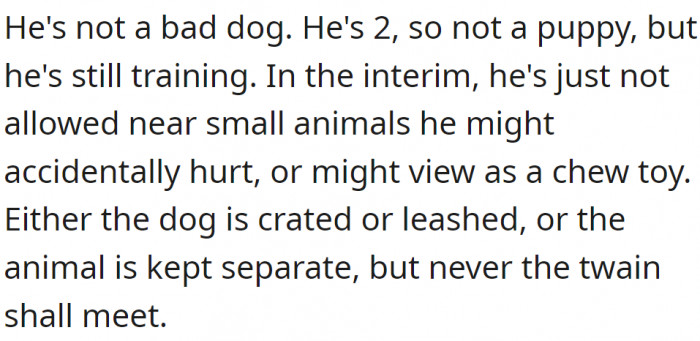
Muzzle

Coping strategies are essential for managing the emotional fallout from conflicts related to pets. Couples may benefit from implementing mindfulness practices, which have been shown to decrease emotional reactivity and improve relationship satisfaction. Research published in the Journal of Marital and Family Therapy indicates that mindfulness can help individuals observe their emotions without immediately reacting, allowing for more thoughtful responses to conflicts. For instance, taking a few deep breaths before addressing an issue involving the pet can create a moment of pause, enabling partners to approach the conversation with greater clarity and calmness.
Incorporating shared mindfulness activities, such as walking the dog together or practicing meditation while in the presence of the pet, can also strengthen relational bonds while reducing stress. This not only promotes a collaborative approach to pet ownership but also reinforces the couple’s commitment to navigating challenges as a team.
The Emotional Toll of Pet Conflicts on Relationships
Conflicts surrounding pets can lead to significant emotional distress for all parties involved. A study from the University of Toronto emphasizes that unresolved relational conflicts can exacerbate feelings of anxiety and insecurity among partners. This highlights the need for addressing pet-related issues promptly to prevent them from escalating into larger relationship problems.
Open communication and collaborative problem-solving can help mitigate the emotional toll, allowing both partners to feel supported and understood as they navigate these challenges together.
Malamut owner says:
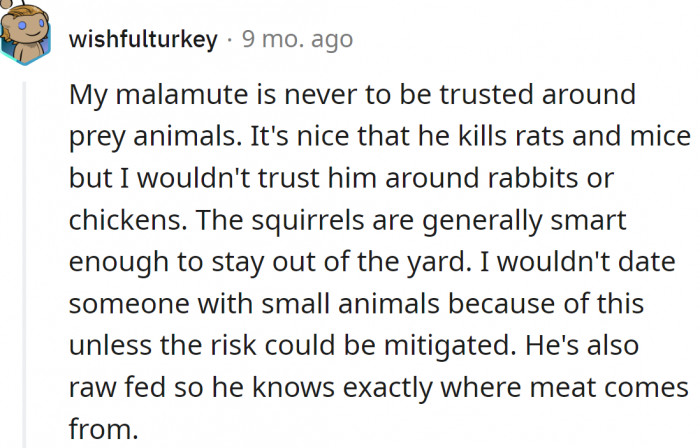
The bottom line is:
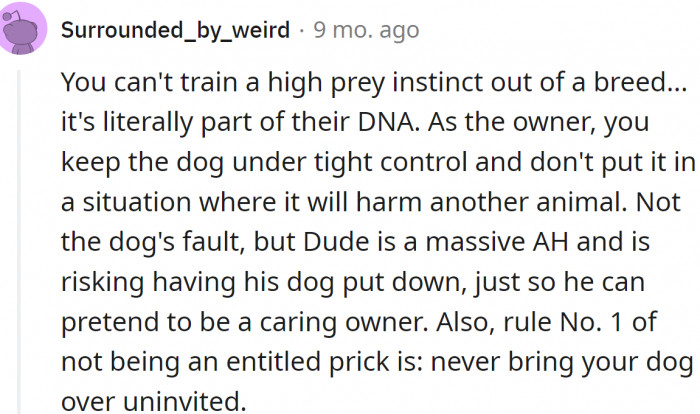
A dog will get aggressive when it is "hunting" something. Usually, they do this by chasing after cats or other small animals. This kind of violence is mostly hereditary in nature rather than hormone-driven. Dogs were created to hunt other animals for food. It is a natural instinct.
Numerous domestic dog breeds are accomplished hunters. In actuality, a lot of breeders were initially employed as hunters. Breeds can be bred to particularly highlight a certain aspect of their predatory character.
For instance, Greyhounds excel in chasing whereas Labradors excel at retrieving their toy. Even little terriers were designed from the start to seek and kill small animals.
Some dogs could even act in a predatory manner toward other dogs, especially if a smaller dog is the target.
Predatory aggressiveness isn't always hostile, unlike other types of hostility. Dogs aren't chasing cars, bicyclists, or cars because they hate them. They just naturally chase things because they can.
Dog owners should get to know their dogs and prevent situations like these.
Psychological Analysis
This situation highlights the complexities of emotional attachments between pets and their owners.
Addressing these challenges with empathy and understanding can foster healthier outcomes for everyone involved.
Analysis generated by AI
Analysis & Alternative Approaches
When conflicts arise from pet behavior, it's important to acknowledge the emotional attachments involved.
Research indicates that fostering empathy and open communication can lead to more constructive resolutions for all parties.
By prioritizing the emotional well-being of both pets and their owners, healthier relationships can be maintained.
Ultimately, ensuring that both partners feel respected in their roles regarding the pet is crucial for maintaining relationship harmony. Research shows that relationships characterized by mutual respect and understanding foster stronger emotional bonds. By prioritizing open discussions and collaborative strategies, couples can work together to create a more harmonious environment for both humans and pets.
This approach not only strengthens the couple’s relationship but also enhances the well-being of the pet involved.
Analysis & Alternative Approaches
In conclusion, navigating conflicts involving pets requires sensitivity and open communication between partners. Recognizing the emotional attachments and insecurities at play can help foster understanding and resolution. By collaboratively addressing pet behavior and establishing clear boundaries, couples can enhance both their relationship and their pet's well-being.
Building Healthier Patterns
Research underscores the complex interplay between pet ownership and relationship dynamics, showing that emotional attachments can evoke intense reactions, sometimes leading to conflict. As studies consistently reveal, understanding attachment styles, effective communication, and mindful coping strategies are key components of navigating these challenges successfully. Creating a shared framework for discussing pet-related issues can foster healthier relationships, allowing both partners to feel heard and valued. Ultimately, the goal should be to enhance relational harmony while respecting the unique bonds that individuals have with their pets.



